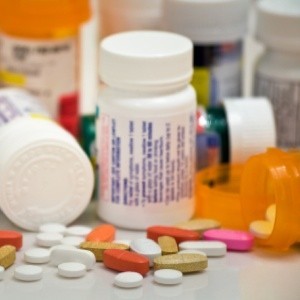
Whether the prescription is for people or pets, most of us can find at least one or two bottles containing unused or outdated medications in our medicine cabinet. When these drugs are not disposed of properly, they can cause pollution in wastewater and end up in our local waterways. Most of these drugs can be safely disposed of in the trash, as long as certain precautions are taken before tossing them out.
In recent year, trace levels of prescription drugs have been found in lakes, rivers, and streams, where they have been found to have adverse affects on fish and other aquatic wildlife. In some cases, community water supplies have tested positive for trace amounts of drug residue. Most drugs are not completely metabolized by our bodies, and the primary way they enter our waterways is through waste water treatment plants. Proper disposal of unused medications can reduce the risk of exposure to these drug residues to both humans and wildlife.
In 2007, the Food and Drug Administration (FDA) and the White House Office of National Drug Control Policy (ONDCP) created a set of consumer guidelines for safe disposal of unused medicine. Here's a summary:
If given, follow specific disposal instructions on the label. Drug labels and the patient information that accompanies them often contain information regarding proper disposal. Look here first. Certain medications (e.g. powerful pain relievers/controlled substances) may contain instructions for flushing to reduce the possibility of unintentional use, overdose, or illegal abuse. However, unless the information specifically instructs you to do so, do not flush prescription drugs down the toilet.
Keep unused medications in their original containers. The labels contain important safety information (should the medication be accidentally ingested) and the caps are typically childproof. Cover the patient's name and Rx number with permanent marker (or scrape it off), but leave the information on the contents visible.
Modify unused medicines to discourage consumption.
Seal and conceal. Tape the medication container lid shut with packing or duct tape, and place it in a non-transparent bag or container like an empty sour cream or margarine container. Don't hide medicines in leftover food products because they could be consumed by wildlife scavengers).
Toss the modified unused medicine in your garbage can. Do not place in the recycling bin.
Many communities now have drug take-back programs that allow the public to bring unused drugs to a central location for proper disposal. To find out if there's a program in your community, call your local waste water treatment facility, trash and recycling service or contact a local pharmacist.

About The Author: Ellen Brown is an environmental writer and photographer and the owner of Sustainable Media, an environmental media company that specializes in helping businesses and organizations promote eco-friendly products and services. Contact her on the web at http://www.sustainable-media.com
Add your voice! Click below to comment. ThriftyFun is powered by your wisdom!
The Earth 911 site has a great index of recycling centers. If you type "drugs" in the find field and your zip code then it will show if there are any take-back programs near your house.
In the Seattle area you can bring drugs to many of the Group Health medical centers.
Help thoses in need of recycling prescription drugs:
In some states they have changed the laws to allow certain leftover drugs to be given to organizations that give them to people with prescriptions that have the need for this drug, but are without money. This is done especially in Cancer & AIDS patients because some of the AIDS drugs cost so much & it's a shame when someone dies to have them go to waste.
I wish this law/program was available when my grandmother died, because we had to throw away perfectly good prescription drugs when we could have given them to someone in desperate need without the funds to purchase them. Thankfully the laws have been changed in a handful of states & hopefully these new laws will soon spread to other states.
Before you toss out any medications, please, call a pharmacists or Google the words "drug repositories" & your state to see if your state has this law so your can help someone in desperate need! New York's law says the drugs must be in their original, sealed package, which sadly means if your had a half bottle of zofran (worth more than $20 per pill), you couldn't donate it. I'm not sure how many of the others states have the same rule. These states also have drug repositories in existence or in the works: Indiana, Hawaii, Minnesota, North Dakota, and Vermont.
More information about drug depository laws:
Ohio: pharmacy.ohio.gov/
Maryland: www.dhmh.state.md.us/
Illinois: www.ilga.gov/
Missouri: www.dhss.mo.gov/
Georgia: wwww.legis.state.ga.us/
NewYork: www.assembly.state.ny.us/
Wisconsin: dhs.wi.gov/
Nebraska: www.hhs.state.ne.us/
Here's is some more interesting information about recycling & disposing drugs:
www.assertivepatient.com/
---> Frequently asked questions:
www.dhss.mo.gov/
Here the pharmacies take them back for safe disposal. Even if it doesn't get eaten by some unfortunate animal sooner or later water is reused and a lot of the trash goes to landfill which brings it back to you eventually. All sounds pretty horrific to me.
Marg from England.
Add your voice! Click below to comment. ThriftyFun is powered by your wisdom!